Turkey’s Revolutionary Conundrum
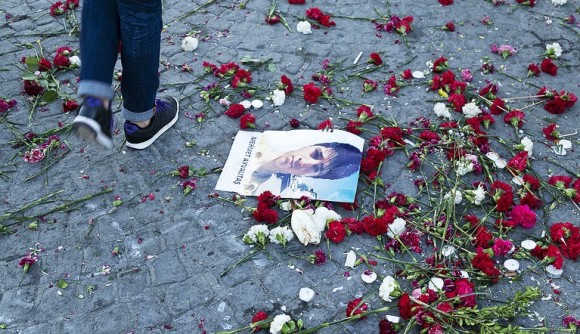
“Things fall apart; The center cannot hold;
Mere anarchy is loosed upon the world, the blood-dimmed tide is loosed, and everywhere
The ceremony of innocence is drowned” William Butler Yeats (1865- 1939)
To characterize the current struggle in Turkey as being a clash of secularism versus Islam — that is, a conflict between the secular demands of the urban Turkish population and the pro-Islamic social conservative forces led by Turkish Prime Minister Tayyip Erdogan and his Justice and Development Party (AKP) — is dangerous. This not only reinforces a western orientalist perception of followers of Islam as being inherently irrational and despotic, but also simplifies the issue while failing to address the greater, complex, and more fundamental flaws in the Turkish political landscape. True, the social conservative and Islamic-inspired policies of Mr. Erdogan have added to the outrage of protesters and a general public who regard the current government as being exceptionally authoritarian. To limit oneself to this rhetoric, however, provides an incomplete narrative.
In fact, the current AKP government is the latest expression of a long tradition of authoritarian and patriarchal regimes that have ruled the country since Kemal Ataturk established a secular Turkish republic in 1923. Likewise the protests are not new in expressing a discontent against this tradition. The violence with which the Turkish government has attempted to quell these protests also represents a familiar policy of suppressing any group, whatever its political and religious affiliation, that threatens the authority of the state and the government. At their core, the protests are the expression of a categorical rejection of a patriarchal and exclusionary system of governance. Mr. Erdogan’s Islamization policies have merely been, for many, the spark that ignited the kindling of discontent.
Demographics of the protests
One of the most impressive aspects of the Taksim/Gezi protests and their nationwide expression is the broad variety of demographics and political affiliations of the protesting groups. Starting with the environmentalists, who were those who initially refused to allow the trees of Gezi Park to be cut down for a gentrification of the area, the discontent with the current government has galvanized socialists, communists, alevites, anarchists, LGBT, anti-capitalist muslims, kemalists and many others in a wide constellation of political interests with one common thread: to erode the power of the AKP. The motives for wanting this erosion differ from group to group. The kemalists want to discredit and weaken their greatest political adversary for the benefit of the Republican Party (CHP); other interests are more reformists in advocating change within the current political system; the more radical protesters (the larger part) are eager to dismantle what they perceive to be an inherently unjust and unbalanced system so as to replace it with a more inclusive and participatory sociopolitical arrangement.
In Turkey’s current pseudo democracy, numerous laws prevent minority groups and interests from having a voice in the affairs of the nation and prevent the establishment of interest groups and parties outside of the CHP and the AKP. Most notoriously, a law that prevents the consolidation of any party without a minimum of 10 percent prevalence within the population has come under particular scrutiny, as it effectively prevents smaller parties and minorities from entering the political arena and popularizing their ideals. Given the extremely restricted spaces offered by the current political system, it is not surprising that many smaller and more radical groups promote a complete reconstruction of this system into a participatory democracy. The way to achieve such a feat is the point on which many of the protesters, groups, and political ideologies differ.
Alternative governance
After 90 years of iron-fist military rule that have resulted in three coups (in 1960, 1971, and 1980) and a decade of oppressive AKP rule, the urban Turkish population realizes that there is little hope for genuine democracy and, for the first time in Turkish history, the masses are asking how to organize themselves so as to provide viable and alternative outlets for democratic participation.
How might one envision the sociopolitical arrangements of post-revolutionary Turkey? The foundations of these have already been laid in the establishment of over 72 popular Forums across the country and in almost every major urban center. These participatory democratic structures are locally focused, but they could easily be expanded to provide a national framework of decision making like the people’s congresses that, until the disastrous NATO operation in 2011, ruled the nation of Libya, or to the neighborhood Centers of the Revolution (Centros de la Revolucion – CDR) in Cuba. The main difference between these examples and the Turkish popular Forums is that the latter do answer to a central governing body.
Currently the Forums deal with issues relating to the struggles and protests, but they could become much more. It should be taken for granted that the more established political interests will not allow such a governance system to cement itself in the mainstream institutional political arena, and it is unrealistic to expect those same interests, magically and spontaneously, to adopt such a system themselves. What is possible is that, should the existence and support of these forums endure, they would become an alternative and parallel system of governance that could, in time, erode the legitimacy of the centralized institutionalized government and its affiliated parties. That is to say: little by little, step by step, and with strong popular support, these Forums could expand their decision-making authority to a broader variety of issues and eventually set up their own “governmental” apparatus. As the authority of such legitimized and popular bodies grow, that of the established institutions will erode. Entire sections of the large urban centers could effectively become self-managing communes under the control of the protesters, where decisions about their affairs are made in the Forums.
For such a grand democratic project to succeed however, the Forums must seek to expand their influence and support, not only amongst those already convinced of their utility, but also to those who might be skeptical of it, and to other marginalized and dispossessed segments of the society. The leftist revolutionary movements have the possibility to benefit from the outrage of those who don’t necessarily agree with their ideological line, to advance their struggles and attempt to coax those opposing voices into their own ideological sphere through this democratic process. At the same time, such groups must be careful not to compromise away their demands and ideology for the sake of garnering support from those who still adhere to an institutionalized conception of governance.
The protests have already had the effect of allowing groups and individuals who have never stood in solidarity with each other, and thus have been mutually antagonistic, to interact for the first time. These interactions with the marginalized and the more mainstream groups have profoundly affected the perceptions of those involved in the struggles, as they learned to view those groups as other humans with something in common, rather than “others.” This has been largely the case with the Kurdish minorities, as well as the LGBT population, whose acceptance amongst the protesters, despite initial hesitations, is now almost unconditional.
Role of labor unions
Despite the relatively weak position of worker’s unions in the Turkish political landscape, their participation in the nationwide protests has been instrumental. In Taksim, for example, union workers were the first to “teach” the younger and less experienced protesters how to build effective barricades against the police’s armored vehicles. As a protester whom I met mentioned:
“First, when there were only environmentalists it was okay, but you know, we were just sitting around and passively resisting arrests, and it wasn’t working. When the workers and the football-team supporters started to come down, they knew what they were doing! Hahaha. You see those fences [pointing]? They could dismantle them in just a minute and bring them over and create barricades against the police. And that’s when we really started putting up a resistance….”
Since this initial sign of support, unfortunately, there has been little explicit interaction between the bulk of the protesters and the worker’s unions, but this relationship must be revitalized and capitalized upon to put real economic pressure on the government and build a truly inclusive democratic movement.
Editor’s Note: Photographs one, two, three, four, seven and eight by Eser Karadag. Photographs five, six and nine by Ruben Rosenberg Colorni.
Related Articles


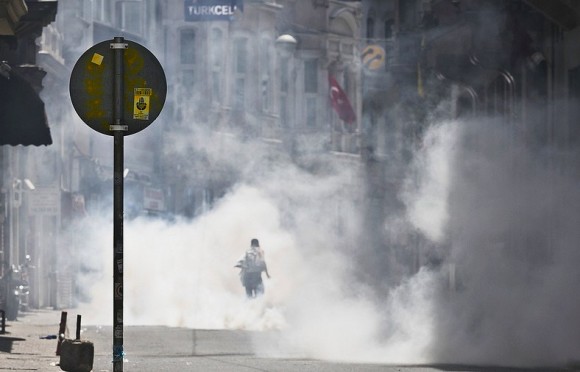
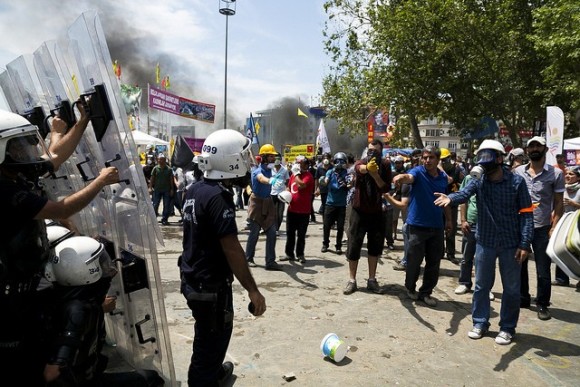
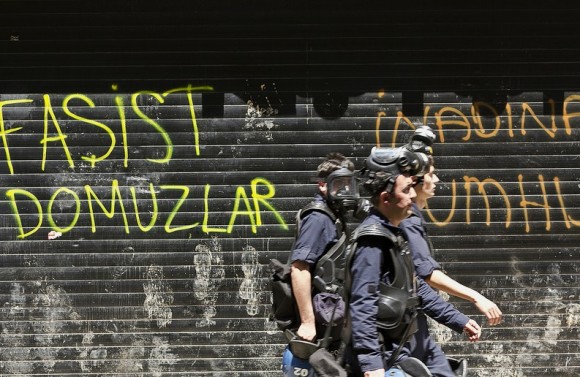
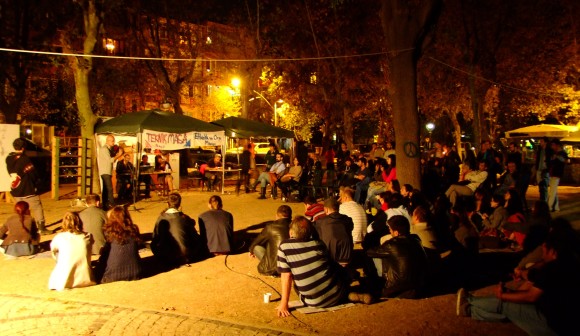
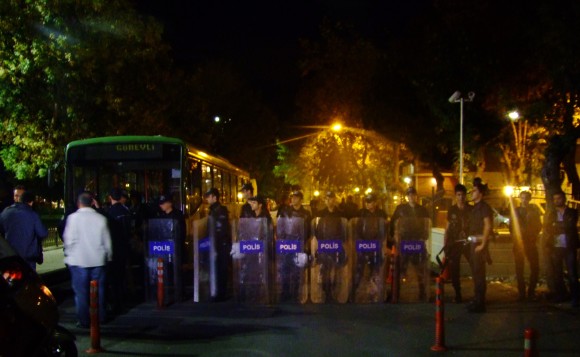
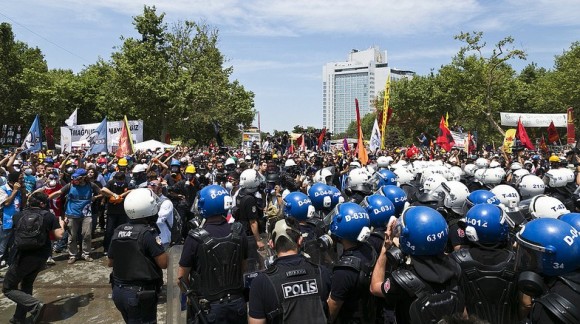
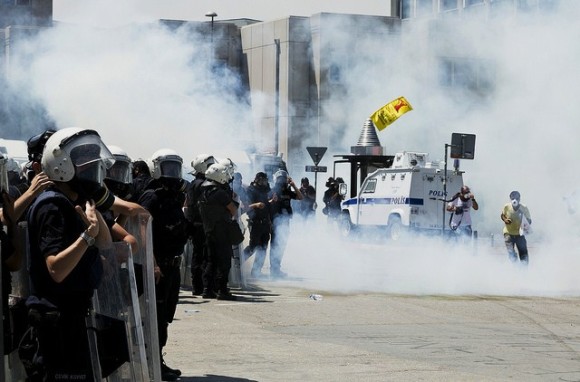
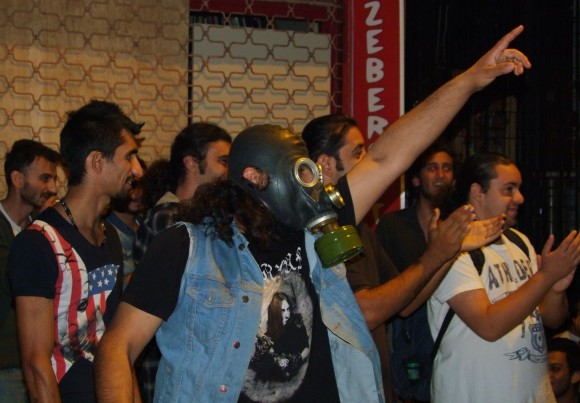











You must be logged in to post a comment Login